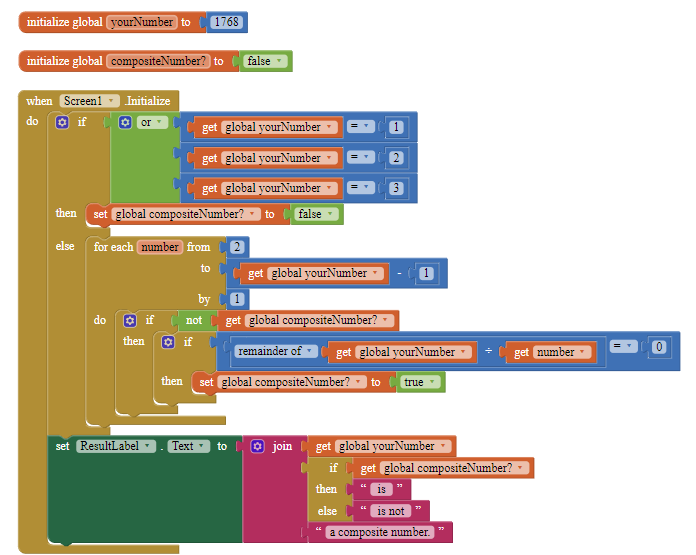Hello my friends, I am new and I can not think of anything I can do to make a very interesting idea with numbers. Please help me to do an interesting work with numbers.
- find prime numbers
- get factors of a number
Thank you for your great idea. Tell me how to calculate the prime numbers of a number. Thank you.
UPDATE:
Try this, this works perfect for me.
Remember to set the variable yourNumber to the number you want to test. I used 1009 as an example. A composite number is opposite to a prime number.
I think it will take you about 150 ms (0.15 seconds) to load.
You can try making an app that verifies the validity of the Collatz Conjecture (famously known as the 3x+1 problem).
Although the conjecture is probably unsolvable, you can at least verify the user's input.
Sorry, I proceeded according to your blocks, but when I enter a number that gives me its prime numbers, it does nothing.
There is no such thing as a 'prime number of a number'. Do you mean 'the factors of a number'?
Hi, I did not understand, that is, to make a program that has all 1 answer, it is not logical or I did not understand what you mean.
For example, if the user enters the number 6, the system must give him 2_3 as a result, or if he enters 12, he must give 2_3_2. do you understand what I mean?
Oh... you want the prime factorization of a number.
I'm glad that there are people who respond quickly
I honestly did not understand what you said, but hahaha 
Yes, can you help me?
The app should verify if the Collatz Conjecture works for a specific number. Here's how:
- The user enters the number.
- If the number is an even number, divide it by 2.
- If the number is odd, multiply it by 3, and then add 1 to it.
By the Conjecture, if it hits a number that has only 2 as its factors, it will simplify down to 1, since, it will divide it by 2 all the way (all multiples of 2 are even) down. At 1, it's a never-ending cycle. Since it's an odd number, you triple it and add 1. This will give 4. 4 only has 2 factors: 2 and 2. So, it will simplify back down to 1.
If you get to 1, then the Conjecture is proved as true for the starting number.
Well, if the user enters a number, what is Montazeri's answer, that is, he should wait for 1 and see his process in the same way with the elephant puff.







Translation error :/
Could you please rephrase that?
Excuse me, I'm not from the United States, I'm getting help from Google. I meant what the user should expect when he enters a number, and one more point, do you know how he calculated the prime numbers of a number? Thank you. Example 6 is 2. 3 or 14 becomes 2.7
Thank you for your effort, but forgive me very much. When I enter numbers like 42, it says output.
1.2.3.6.7.14.21
But 14 and 21, which is not the first number of Nissan or the number 25, whose output is 5 and 1 ... 5 in 1, which is not 25, but for now
